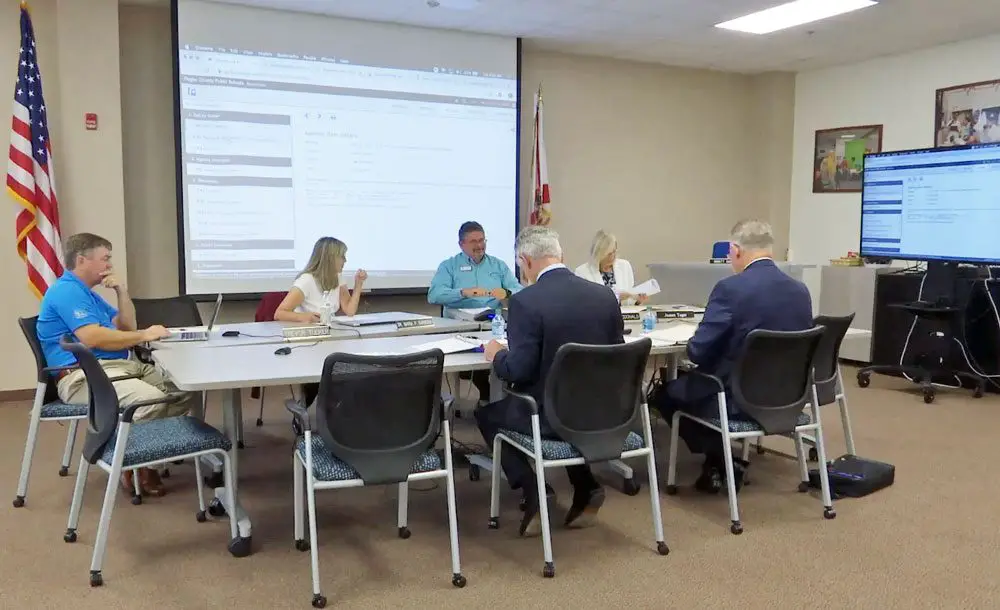
The Flagler County School Board is aiming for as democratic and inclusive a process as possible as it chooses its next superintendent, a decision expected on March 10–almost three months before the end of Superintendent Jim Tager’s contract. Tager is retiring at the end of June.
The ultimate decision is the school board’s, of course. But over the next few months, the board intends to involve the community and its staff to an extent unseen in previous superintendent searches in Flagler, and there’s been many of those: the next superintendent will be the sixth in 16 years. At an hour-long special meeting this morning, the board ratified the road map for the next few months as it makes its way to that appointment. Appointing a superintendent is generally regarded as a school board’s single most consequential decision. The superintendent and the school board attorney are the only two employees board members may direct, hire or fire. They are not allowed to direct staff members at any level.
To make its decision, the board will rely on an internal “focus group” of district employees, on an advisory group of residents, businesses and interest groups, on a community survey open to all, and on a community forum where the public at large may provide input, all to be taking place between the end of October and mid-February. Only then will the citizens’ advisory group short-list applicants from a national search for the board, which will then take up the relay and decide who, on that short list, will be interviewed.
The interviews are scheduled for March 4, 5 and 6.
“I’ll just commend the board on involving the community,” the Florida School Board Association’s John Reichert told the board at a special meeting this morning. Reichert and the association’s Bill Vogel are the board’s consultants for the superintendent search. They will also be facilitating community and staff meetings.
The internal focus group was initially conceived as a group of some 25 employees handpicked by the school board members. But board members were more inclined to open up that group to anyone, and that’s the route they agreed to take: “I doubt we’re going to have over 100 employees come, if we did that would be a great turnout,” School Board member Trevor Tucker said. He was not interested in submitting lists of names.
The focus group will meet at the Buddy Taylor-Wadsworth Elementary cafeteria one time, on Oct. 30. Participants must be school board employees–any of its 1,700-some employees. The School Board Association consultants will manage the group. Three weeks later, the consultants will hold a similar meeting for the community at large, in the same venue, what the consultants describe as a “come one, come all community forum.” Residents will describe who they want to see in the next superintendent.
Meanwhile next week, on Oct. 21, the district will make available an online survey seeking input from residents at large. The survey will be open through November 22.
The survey will ask participants to identify themselves–not by name, but by by category: if they’re a parent, a student, a staffer, a business leader, and also by zip codes.
The consultants will then compile all input, synthesize them and turn them in to the school board. The information will be used to devise the advertisement for the position, which will circulate in trade publications and online for six weeks, until the end of January.
On Feb. 4, the citizens’ advisory committee will meet for the first time. The committee will be made up of 25 people: 10 will be representatives of major interest groups, including the chamber, Realtors, the teachers’ and service employees’ unions, the countywide PTA representative, and so on. The remaining 15 members will be appointed by school board members, with each member appointing three individuals.
The advisory group must abide by all sunshine law requirements: its members may not speak to each other about their committee responsibilities, or anything involving the superintendent pick, outside of their public meetings, and all documents they will handle or exchange will be public records. (School Board attorney Kristy Gavin will outline their responsibilities.) The committee’s responsibility will be to go through the stack of applicants and reduce the stack to about 20 at its first meeting.
Committee members will then take those 20 names and study their background, contact their references and do whatever other research they are able before the committee’s second meeting, when it will reduce the names to a short list of eight to 10. If it’s not able to do that in two meetings, it might meet a third time. If not, then names will be turned over to the school board.
Nothing stops school board members from adding to that list, of course: none of the steps or processes outside the school board’s purview are more than advisory.
On Feb. 25, the board will decide what four or five individuals to interview, and hold those interviews in early March. It will vote on a new superintendent on March 10.
Janet McDonald, who chairs the school board, summed up the school board association’s proposals at this morning’s meeting–which Tager did not attend–in four words: “Energetic and wonderful revisions.”





























FPC Granny says
Well, when it snows in Florida will I believe that the school board is going to truly include the community’s input in their decision. It sounds good… but is a big waste of time and resources….because as it says….the school has the final decision!!
Geddy L says
This process should be efficient. Ffs